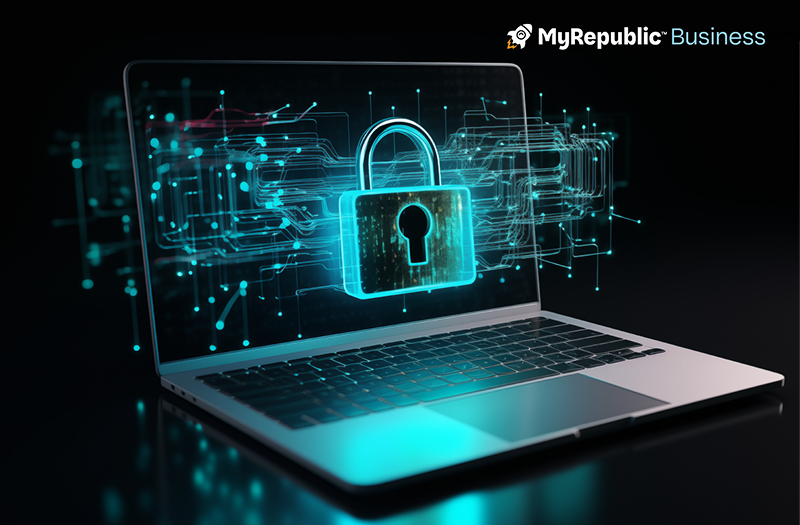8 Ways SMEs can Prepare for Cybersecurity Threats

Cybersecurity isn’t just a concern for big corporations anymore. In fact, SMEs in Singapore are becoming increasingly attractive targets for cybercriminals due to limited resources and less sophisticated security measures.
As cyber threats evolve and become more complex, it’s critical for small and medium-sized businesses to stay one step ahead. But, how can you prepare your SME for today’s emerging cybersecurity challenges? Here are a few ideas of where to start.
1. Understand the New Cybersecurity Landscape
Gone are the days when basic antivirus software and a firewall were enough. With AI evolution, today’s threats include more advanced types of ransomware, phishing as a service, supply chain attacks, and even insider threats. SMEs are especially vulnerable because they often serve as entry points to larger partners or clients. Understanding the nature of these risks is the first step to defending your business. Stay informed through reputable sources, follow cybersecurity news, and consider regular consultations with security professionals.
2. Assess Your Current Security Setup
Before making changes, take a close look at your existing cybersecurity measures. Do you have a formal IT policy? Are your software and operating systems regularly updated? Is your team aware of phishing red flags? What is your cyber incident response plan? A quick internal audit or a basic risk assessment from a cybersecurity partner can reveal where you might be falling short. Knowing your gaps is half the battle.
3. Educate and Empower Your Team
Your employees are often the first line of defence. One careless click on a suspicious email can cause a lot of damage. That’s why cybersecurity awareness training should always be a priority. Teach your staff about strong password practices, how to spot phishing attempts, and why it’s important not to install unapproved software. Regular refresher sessions and simulated phishing tests can go a long way in keeping your team alert and prepared. Prevention is always better than cure!
4. Adopt a Zero Trust Approach
Zero Trust might sound intense, but it’s a practical mindset for modern cybersecurity. It means do not automatically trust anything or anyone inside or outside your network. Instead, every access request should be verified. For SMEs, this could mean implementing multi-factor authentication (MFA), limiting user access on a need to know basics, and managing accounts regularly such as reviewing account permissions. It’s about putting up speed bumps for potential attackers.
5. Secure Your Data with Backups and Encryption
Data is the lifeblood of most businesses today, and losing it to a cyberattack can be devastating. Make sure your critical data is backed up regularly and stored securely—ideally offsite or in the cloud with a reputable provider. Encryption adds another layer of protection, especially for sensitive customer or financial information. If something goes wrong, having a clean backup can save you days of downtime and lost revenue.
6. Consider Managed Cyber Incident Response
While prevention is key, it’s also wise to have a safety net. Having cyber insurance or managed incident response can help cover costs related to data breaches, ransomware attacks, or business interruption. It’s not a substitute for good security practices, but it can provide financial relief when things go south. Additionally, a managed incident response service ensures that when an incident occurs, your organisation can respond quickly and effectively, minimising damage and recovery time. With experts on call to handle containment, investigation, and remediation, your business is better equipped to limit operational disruption and protect its reputation in the face of a cyber crisis. Talk to your insurance provider about what options are available for your business size and industry.
7. Work with a Trusted IT Partner
You don’t have to tackle cybersecurity alone. Many SMEs partner with managed service providers (MSPs) or cybersecurity firms to help monitor systems, respond to threats, and stay compliant with regulations. Look for providers with experience in SME environments, and make sure they offer proactive support rather than just putting out fires when something goes wrong.
8. Keep evolving with the times
Cyber threats won’t stand still, and neither should your defenses. Make cybersecurity an ongoing priority. Review your policies regularly, stay updated on new risks, and be ready to adapt. The more proactive you are now, the better prepared you’ll be if an incident ever occurs.
Emerging cybersecurity threats can feel overwhelming, but with the right approach, SMEs in Singapore can build strong, flexible defences. Start with the basics, educate your team, secure your data, and don’t hesitate to get expert help. In today’s digital world, a little preparation can go a long way in protecting your business.
Need a trusted partner to help secure your business? Explore our tailored cybersecurity services for businesses in Singapore.



















